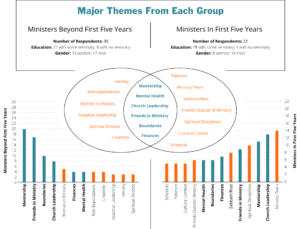Flourishing in the First Five Years of Ministry
Researcher Matt Bloom begins Flourishing in Ministry, his work on pastoral wellbeing, with the story of Carolyn. Carolyn discovered a love for theology and ministry in college and switched vocational paths from medicine to ministry. Her time in seminary enriched and affirmed her calling. But her first ministry position was a challenge. A solo pastor in a rural church, she often met people who did not support her call as a woman. These criticisms, as well as the pressures of the solo pastorate, weighed on Carolyn. She grew in her pastoral voice and identity but, eventually, began questioning her own calling. She was at a crossroads: should she leave ministry or stick it out?
Many pastors find themselves at similar crossroads early in ministry. Bloom reports that clergy suffer from higher levels of burnout than most working Americans, and recent reports document high levels of PTSD-symptoms in clergy. Though ministers are often expected to navigate these challenges on their own, pastoral wellbeing also affects the congregations, communities, and seminaries in which pastors serve and learn. This year, the Ministry Resource Center has been exploring the questions, what contributes to ministers’ flourishing in their first five years? What hinders flourishing? We gathered wisdom from two surveys, one sent to those in their first five years of ministry and another to those who once were in their first five years. In listening to ministers in various contexts, we discerned five major areas ministers connect to flourishing.
Mentoring
Mentoring was one of the most frequently mentioned contributors to pastoral flourishing across both surveys. Thirty-one of the fifty-two total respondents commented that having a consistent and more experienced mentor was essential for their thriving in the first five years. Mentors offer wisdom, serve as sounding boards, and provide support and discernment for new ministers.
Relationship with Peers and Friends
Thirty-one of the fifty-two total responses mentioned other supportive relationships as essential for flourishing. These comments fell into two categories: support from outside the ministry context and support from within the ministry context. In the first group, respondents mentioned the value of friendships with other ministers serving in different contexts, as well as having friends and family who are not in their ministry context. One commenter stated, “We need a place to just ‘be,’ where no one asks anything of us and is just happy to see us.” The second group of comments focused on having support within the ministry context itself, specifically through working in a team structure or knowing other staff supported them.
Relationship with Leadership
Related to support within the ministry context, twenty-one respondents commented that relationships with leadership can make or break a ministry experience. Several shared stories of conflict with church leaders as hindering their thriving. Others mentioned that healthy leadership within a ministry, such as a wise group of elders, was essential for their flourishing in ministry.
Relationship with God
“First of all,” one commenter shared, “[ministers] need intimacy with Christ as the source of all fruit being born.” Twelve respondents mentioned their relationship with God as an essential aspect of their thriving, with most of these comments from those currently in their first five years. These respondents noted the importance of spiritual disciplines and mentioned specific practices such as prayer and Bible study. Related, ten mentioned having a regular practice of Sabbath as essential for thriving.
Balance and Burnout
Related to Sabbath, sixteen raised concerns about boundaries and balance. One respondent shared: “Even though I was young and energetic, I spent a lot of time those first 5 years worn completely out physically, spiritually, and emotionally. I learned that people will call you out on a lot of things you are doing poorly, but working too hard and too much is not often one of those things…I wish someone had pulled me aside and helped me find a better balance between life and ministry.” Other comments mentioned rest, discernment about workload, balancing time with family and ministry, and burnout. Some connected burnout to the unclear expectations of ministry in general or in their specific context. Related, several mentioned the importance of therapists, spiritual directors, and healthy exercise and diet as helping combat burnout. “I wish someone had told me, every day, that keeping myself healthy was as important as trying to keep everyone else healthy,” shared one respondent.
While these five themes clearly emerged, responses revealed other elements of thriving. One responder summarized these elements: “patience, consistency, a hobby, friends outside of their ministry context, ministry peers outside of their ministry context, a curiosity about the locality where they serve, regularly adequate sleep and nutrition and exercise, boundaries around the ‘work week’ and ‘family time,’ regular spiritual and intellectual habits outside of their ministry responsibilities, a desire for deep relationships, a willingness to be wrong and to ask forgiveness, a mindset of empowering others for ministry….” Additionally, several women mentioned that support for women in ministry enabled flourishing. One respondent commented, “It would have been nice to have a network of women in ministry to learn from and to ask questions of.” Other themes included mental health, financial concerns, pastoral authenticity, reliable weekly rhythm, cultural context, learning resources, and leadership opportunities and training.
For ministers, intentional discernment regarding priorities is key, as well as adopting daily wellbeing practices. Serving in an atmosphere of trust and flexibility that encourages wellbeing on multiple levels is essential.
These answers reveal that flourishing in ministry is multifaceted. For ministers, intentional discernment regarding priorities is key, as well as adopting daily wellbeing practices. Serving in an atmosphere of trust and flexibility that encourages wellbeing on multiple levels is essential. For congregations, Matt Bloom encourages open conversation about pastoral wellbeing and workloads: “I suggest a simple but potentially very helpful approach: find a way to alleviate or end at least one-third of the pastor’s duties…the pastor will feel like he or she is underperforming because his or her days are not overwhelming. But…most days should end well, not end with exhaustion” (27).
Bloom shares that Carolyn decided to stay in ministry, but she discerned with mentors, a therapist, and a spiritual director to find a more life-giving context. She moved to a church closer to family members who could help with childcare. She is part of a pastoral team with another full-time pastor. Her role as a woman is valued, and she and her fellow minister both commit to balancing time inside and outside the ministry. Together, Bloom reports, “they have taught the congregation that their pastors are multifaceted: pastors, parents, spouses, community volunteers, disciples, humans” (xvi). While Carolyn has “learned that ministry is difficult work and some days wonders why she ever followed this path…she is thriving” (xvi).
Laura Hicks Hardy is the Seminary Program Coordinator at Emmanuel Christian Seminary at Milligan. View Emmanuel’s Academic Programs page here.






